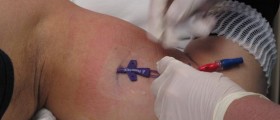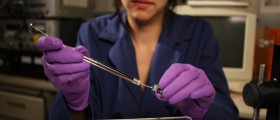
Stage IV Melanoma
Stage IV melanoma is metastatic stage of the disease and it features with spread of the primary tumor to lymph nodes and distant organs. The treatment for metastatic stage of melanoma is not standardized. Namely, the medical consensus is that patients suffering from stage IV melanoma should be considered potential candidates for clinical trials. Unfortunately, none of the available treatments is effective enough. The treatment is basically palliative and aimed to reduce the pain and try to improve a patient's quality of life.
Systemic therapies such as chemotherapy may be beneficial to certain extent. However, majority of patients do not respond to the therapy and have to face progression of the disease. Only 5-10% of all patients with stage IV melanoma actually respond to certain treatments. This provides with hope and optimism for all patients who are suffering from terminal stage of this horrible disease.
The most frequently applied treatment modalities for stage IV melanoma include chemotherapy, biologic therapy, a combination of the previous two and surgery. The best results and response rates as well as long term remission are achieved with a combination of chemotherapy and biologic agents. This combination is the main focus of ongoing studies of metastatic melanoma.
Chemotherapy for Stage IV Melanoma
Dacarbazine is the most frequently used chemotherapeutic agent in metastatic stage of melanoma. The response to this chemotherapeutic is approximately the same as the response to three-drug regimen which includes dacabarzine, cisplatin and carmustine. Still, the better response is achieved with this combination of drugs. Additionally, patients may benefit from a new oral chemotherapeutic temozolomide which may be administered alone or in a combination with thalidomide.
Biologic Agents for Stage IV Melanoma
Immunotherapy uses biologic agents which can either stimulate or restore the ability of immune system. Boosting of the immune system is one way to fight the cancer. Alpha-interferon and interleukin-2 are most commonly used agents for this purpose. These agents activate specific cells of immune system to attack and fight against cancer cells. Alpha-interferon can cause satisfying response but the doses that are required are rather high and high doses of alpha-interferon carry significant risk of toxicity. A combination of alpha-interferon and other agents is even more effective than if this agent is used alone. Interleukin-2 is also effective. Still, it is extremely toxic especially if administered in high doses. During the treatment with interleukin-2 patients need to be hospitalized and carefully monitored.
Today some researches are investigating the effectiveness of a combination of chemotherapeutics and biologic agents and compare the effects to results achieved with chemotherapeutics alone.
Surgical Treatment for Stage IV Melanoma
Surgery in stage IV melanoma is only palliative. It may relieve certain symptoms such as obstruction, pressure, or bleeding. The major benefit is evident in patients suffering from isolated metastases which can be successfully removed. Surgery is only performed in patients who are healthy enough to undergo the surgery and in case that metastases are accessible.

















Your thoughts on this
Loading...